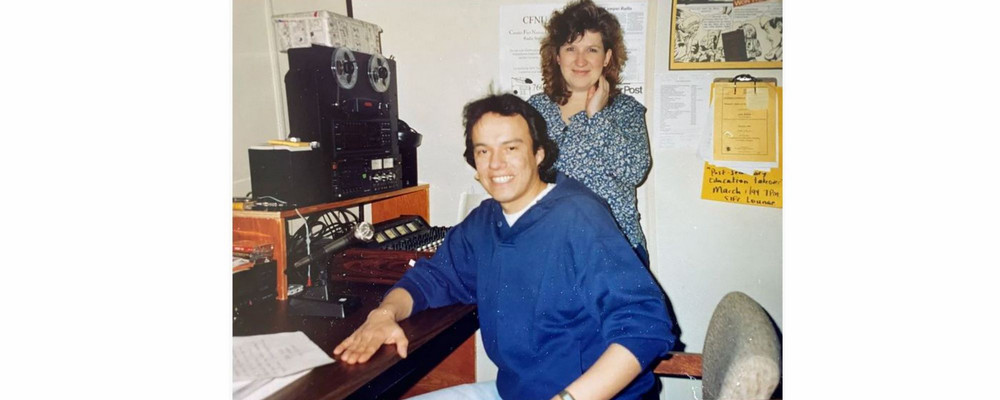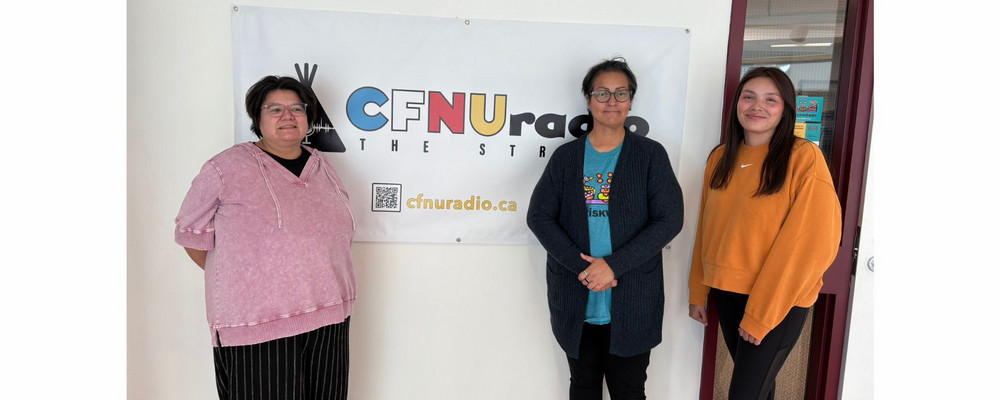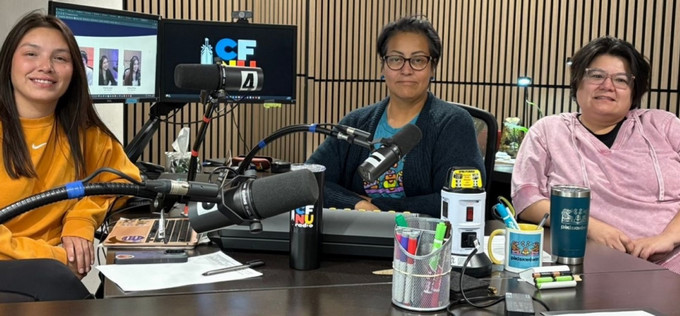In 1994, a group of Indigenous Communication Arts (INCA) students, together with INCA instructor Shannon Avison, created the CFNU radio station. The original station was in a trailer belonging to Saskatchewan Indian Federated College (now the First Nations University of Canada), just outside of the College West building on the University of Regina campus.
Now, over 30 years later, CFNU is streaming to a global audience from cfnuradio.ca thanks to a dedicated team of First Nations University staff, faculty, and students.
Amplifying Indigenous Voices
Dedicated to amplifying the voices of the First Nations University of Canada community, the station gives students, staff, and community members the opportunity to find their voice.
With Canada’s dark history of residential schools, CFNU has become more than just a radio station for Station Manager Lindell Haywahe and the students involved with it.
I love it when students find something that they're passionate about and they want to talk about, and they want to share that information. This is what makes it fun, the people that are here want to be here. — Lindell Haywahe, Station Manager at CFNU
“When you think about residential schools, the colonialism, the silencing, it's almost like what we are doing here is making it okay for people to use their voice as a tool,” she says. “I grew up on the reserve, and I went to residential school. You were never supposed to be that person who whose voice was louder than others, especially being a girl. Now, I'm on the radio and people hear my voice. I make people more comfortable with their voice and I'm able to give them the confidence to use their voice.”
Hands-on learning leads to practical knowledge and skills
Students from across several programs find a place of belonging that also helps them grow personally, and professionally, at the studio.
“When students want to get involved, step one is to walk through the door, and step two is to tell me your name,” says Haywahe. “It’s very simple. I love it when students find something that they're passionate about and they want to talk about, and they want to share that information. This is what makes it fun, the people that are here want to be here.”

Nelson Bird and Shannon Avison at the original CFNU studio. Credit: Photo from www.cfnuradio.ca/about-us
Haywahe can’t help but think of Brittany Poitras, an Indigenous Studies and Indigenous Communication Arts student, as a great example of a success story coming out of CFNU. She got involved with the station over two years ago, and she’s now working as a video journalist with CTV.
“It’s nice to see students grow. I have seen Brittany from her first time on the air, to now being on CTV,” says Haywahe. “I really enjoy that part of my position. Helping students with their presentation, how they talk, and being able to make their voices heard.”
Student involvement vital to CFNU
Amanda Leader and Lori Deets are both active student volunteers at the station, which relies on grants to hire staff. The majority of their grants come from Heritage Canada.
Leader is a student in the Faculty of Media Art and Performance (MAP), with a major in Indigenous Arts and a minor in Psychology. She is also working on a certificate in Indigenous Communication Arts.
Leader’s involvement with CFNU started when she would go on the air to give brief updates on behalf of the FNUniv Student Association.
“By doing the updates for the student association, I fell in love with radio and have never left,” says Leader.

L to R: Lori Deets, Lindell Haywahe, and Amanda Leader outside of the CFNU studio. Credit: Photo by University Communications and Marketing
Since then, she has worked as a producer for the Nelson Bird Show, and hosted the station’s daily live radio show, Waná, as well as Academic Vibes, and Masaska, a financial wellness program with Cate Morris.
Deets recently completed the Indigenous Communication Arts program and is continuing to take classes in the Indigenous Studies program while she volunteers her time at the station.
“I started coming into CFNU because this is where I wanted to do my internship [for the INCA program]. I’ve always been a bit on the fence about journalism, but I love storytelling,” says Deets. “I’ve been able to do some magnificent interviews with people while I have been here, and it’s such a great way to be doing radio but not have all of the anxiety that can sometimes be associated with it. Lindell is really good at letting people be, and letting people do as they are.”
Sharing stories for years to come
The studio recently went through upgrades such as installing a new broadcast console, also known as a mixing board, and the addition of cameras, which gives students the opportunity to incorporate video into their podcast offerings. Haywahe hopes the video content helps elevate the podcast experience for students and encourages more of the community to share their stories.
“I think the important thing about the station is to be responsible for our own narrative, moving forward. This includes non-Indigenous people who want to be involved, they can also be a part of that narrative of their lives,” says Haywahe. “We have opportunities here for people to be responsible for their stories, and, moving forward, for the preservation of their life stories. And everybody's got a story.”
Tune into CNFU.ca to listen live.
CFNU offers listeners a range of options to tune in to, including The Nelson Bird Show, the live morning show, Waná, which showcases a dynamic mix of news, music, and special guests.
INCA students and Indigenous Fine Arts students also initiated the Indigenous language podcast project pîkiskwêwin Listeners can check out variety of podcasts in Cree, Dakota, Dene, Mohawk, Nakota, Michif, Saulteaux, and more!
Banner image: Amanda Leader, Lindell Haywahe, and Lori Deets at the CFNU studio. Credit: Photo by University Communications and Marketing
About the University of Regina
At the University of Regina, we believe the best way to learn is through access to world-class professors, research, and experiential learning. We are committed to the health and well-being of our more than 16,600 students and support a dynamic research community focused on evidence-based solutions to today’s most pressing challenges. Located on Treaties 4 and 6—the territories of the nêhiyawak, Anihšināpēk, Dakota, Lakota, and Nakoda peoples, and the homeland of the Michif/Métis nation —we honour our ongoing relationships with Indigenous communities and remain committed to the path of reconciliation. Our vibrant alumni community is close to 95,000 strong and enriching communities in Saskatchewan and around the globe.
Let’s go far, together.
